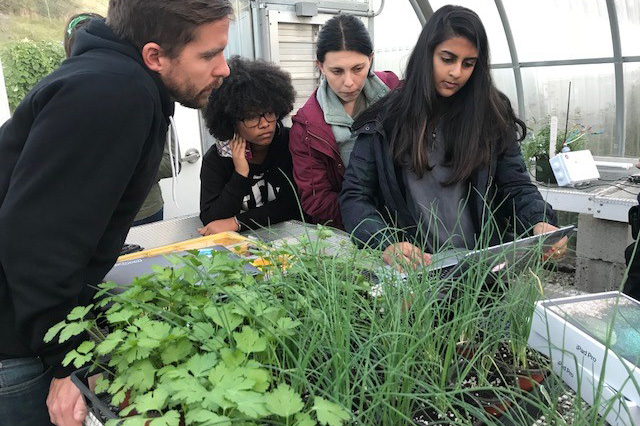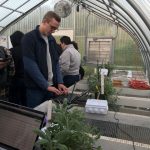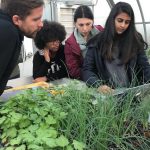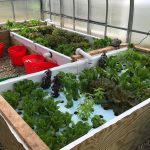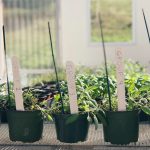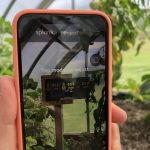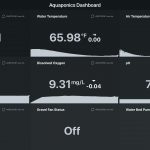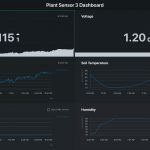On select Tuesday nights, Radhika Kanaskar ’18 (BUS) pops on warm boots and a heavy coat, and prepares for her management information systems class at UConn’s Spring Valley Farm.
Having class in a greenhouse, five miles away from the bustle of the main campus in Storrs, appeals to her because it merges her interests in gardening, sustainability, and information technology, all in one place.
As part of the class, “Introduction to Industrial IoT,” OPIM 4895, Kanaskar and 14 classmates are using data analytics and emerging technology to bring greater predictability to managing the University’s aquaponics facility, and a dedicated greenhouse for herbs, at the farm off Spring Manor Road, near the Depot Campus.
“I didn’t really need another class this semester,” she says, “but it sounded so cool, I signed up.”
Emerging Tech Skills Sought by Companies Worldwide
Students just love this project because they can see the immediate impact that data analytics are having on the farm. — Jon Moore
Jon Moore, an instructor-in-residence, says the course was developed as an elective after students packed a workshop on the Internet of Things (IoT) last spring. IoT is any system that uses sensors, software, electronics, and connectivity to collect and exchange information with other devices, a human operator, or a manufacturer. The emerging technology is gaining tremendous attention as a tool to solve business needs.
In the early weeks of the course, students learned about aquaponics and how technology can enhance the effort to develop sustainable farming. Initially they became familiar with the sensors and how to compile data and monitor conditions for the fish.
During the second phase of the class, the students apply what they have learned to grow oregano, thyme, and sage in an adjacent greenhouse. They monitor the greenhouse air temperature, soil humidity, electricity usage, and other data, which is all stored on dashboards that can be accessed from anywhere and not just the farm itself. The dashboard is created using a data analytics tool called Splunk.
“Students just love this project because they can see the immediate impact that data analytics are having on the farm,” says Moore, who is also director of the School of Business’ emerging technology program, called OPIM Innovate. “This type of hands-on learning translates to real-world skill in emerging technology, which is highly sought after by companies worldwide.”
“This technology is very new, and up-and-coming,” says Ryan O’Connor, an adjunct professor of operations and information management, who is teaching the course. “The business advantages of using a piece of software like Splunk are really limitless.”
The students have designed their dashboards to notify them if, for example, the greenhouse becomes too cold, or if a door was left open. The dashboard can be accessed from a computer, phone, or Apple TV.
“This generation does things differently,” O’Connor says. “They are more mobile, and want information that is more agile. Now, it’s in their pockets.”
The course at Spring Valley Farm is a collaborative effort by the School of Business, the School of Engineering, and the College of Agriculture, Health, and Natural Resources. It is part of the School of Business’ larger initiative to give students knowledge and experience with data analytics, virtual reality, microcontrollers, 3D printing, and other emerging technology.
Moore says the MIS program will continue to work with teams at Splunk to bring cutting-edge, analytics-based curriculum to UConn students. In the spring, the School will be offering a special-topics course on “Foundation of Machine Learning,” which will focus on using the Splunk Machine Learning Toolkit. And, he says, the School is exploring additional real-world projects that entail experiential learning.
‘Everything Today Can Be More Automated’
Back in the greenhouse, Abigail Chromik ’20 (BUS), an MIS major with a minor in analytics, says once she recognized the potential of IoT in business, she was eager to learn more.
“This class is definitely different from most. With our aquaponics project, we can monitor everything in the environment and watch for dangerous levels,” she says. “To apply this technology to a larger farm could definitely save a business a great deal of money. It seems everything today can be more automated.”
Nicole Hamilton ’19 (BUS), an MIS major, says she enjoys innovative technology and was familiar with Splunk through an internship and part-time work at United Technologies Corp.
“Now I can say, ‘Oh, I’ve had experience with that.’ We talk about the ways you can better use data, and how Splunk can help,” she says. “I’ve enjoyed trying to figure out how we can help the farm and its operations using sensor data.”
